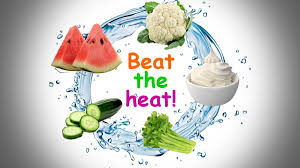Nutritionists and Doctors Advise How to Adjust Your Diet When Temperatures Soar
With sweltering summer temperatures already descending across much of the nation, health experts are issuing guidance on how to adapt eating habits to stay energized, hydrated and safe during the hottest months of the year.
Prolonged heat waves can present major dietary challenges that range from appetite suppression and increased fluid loss to heightened risks of foodborne illnesses. Nutritionists warn that failing to adjust your food intake properly when the mercury rises can lead to fatigue, dizziness, cramping and other heat-related ailments.
“Our bodies have to work much harder to maintain safe temperatures when we’re exposed to extreme summer heat,” said Dr. Samantha Heller, a nutritionist at New York University’s medical school. “That means we need to eat and drink differently to meet those ramped-up energy demands while also replenishing fluids and nutrients lost through increased sweating.”
Heller and other experts emphasize that getting the proper balance of water-rich, cooling foods with the right mix of nutrients is crucial for the body to operate at peak performance in the hot summer months. Here are some of their top tips:
Stay Hydrated, But Don’t Overdo It During summer heat waves, our bodies can lose over a liter of fluid per hour through sweat and exhalation alone. But attempting to replace those losses with water alone could potentially flush out too many essential nutrients. Nutritionists recommend consuming foods with high water content like watermelon, cucumbers, berries, bell peppers and leafy greens, which also provide valuable micronutrients and antioxidants.
“It’s about staying hydrated, yes, but we can’t simply drink our way out of dehydration,” said Dr. Connie Diekman of Washington University in St. Louis. “Eat plenty of hydrating fruits and veggies to replenish both fluids and electrolytes. And limit alcohol, sugary beverages and empty liquid calories, which can actually worsen dehydration.”
Replace Salt, But Not Too Much While sweating causes us to lose salt through our pores, most Americans already get too much sodium in their diets via processed foods. Rather than indiscriminate salt loading, nutritionists suggest lightly salting foods and using salt-containing seasonings like soy sauce. They also recommend consuming potassium-rich fruits like bananas, melons and oranges which help balance sodium losses while also providing energizing nutrients.

“Getting the right sodium-potassium balance is key for maintaining proper fluid levels during the stress of extreme heat,” said Dr. Rachel Scherzer of the University of California-Davis. “But the average American definitely needs to focus more on increasing potassium intake from fresh produce rather than ramping up sodium.”
Eat Foods That Energize, Not Weigh You Down Summer heat can certainly put a damper on your appetite and make heavy, fatty meals seem unbearable. Dieticians suggest sticking to lighter, cooling foods that are easier to digest, nutrient-dense and provide lasting energy. Great options include fresh fruits and vegetables, lean proteins, whole grains, yogurts and healthy fats like those found in nuts and fatty fish.
“Go easy on the proteins and favor smaller portions of poultry, fish, eggs and Greek yogurts over red meat, which metabolizes less efficiently and can leave you feeling sluggish in the heat,” said Kelly Manlou, a nutritionist at Mount Sinai Hospital in New York. “Complex carbs from whole grains are easier to digest than simple sugars too.”
Manlou and others also recommend eating multiple smaller meals and snacks versus one or two large, heavy sit-down meals during sizzling temperatures. The lighter meals are easier on digestion while grazing prevents energy crashes by maintaining steady blood sugar levels.
Dress It Up With Flavor, Hold the Grease One of the biggest summer diet woes? All those greasy, fat-laden foods we crave because they seem to provide a quick energy boost. But nutrition experts warn they’re really just weighing you down unnecessarily and should be limited. Instead, perk up your summer dishes with flavorful herbs, spices, vinegars and citrus juices/zests to keep things light and refreshing.
“The body is already working hard in the summer heat to stay cool. Don’t make it toil to digest a bunch of grease too,” said Courtney Key, a nutritionist at Emory University. “Fresh herbs, spices and acidic dressings add amazing flavors without heaviness. Think mint, dill, basil, ginger, chili lime, etc.”
Key also recommends swapping out processed cooking oils for lighter plant-based ones like olive, avocado or nut oils to reduce the heavier fat content. And while crunchy salads and slaws are great summer staples, go easy on creamy dressings and opt for vinegar or citrus-based varieties instead.
Seek Out Probiotics and Prebiotics When temperatures become oppressive outdoors, the interiors of homes and restaurants can unfortunately become breeding grounds for harmful bacteria that cause foodborne illnesses. Keeping your gut healthy and fortified with beneficial probiotic and prebiotic foods can help protect against food poisoning.
Great sources of probiotics (“good” gut bacteria) include yogurt, kefir, aged cheeses, fermented foods like kimchi, miso, sauerkraut and pickles, plus supplements. Prebiotics are the foods that feed existing probiotics like bananas, onions, garlic and whole grains.
“Summer heat creates ideal environments for pathogenic bacteria growth,” said Dr. Maria Hauser of Case Western Reserve University. “Consuming probiotic foods and beverages strengthens your gut’s defenses against illnesses like salmonella, E. coli and listeria that can be contracted through spoiled foods.”
Let’s Eat Outside the Box Wilting summer temperatures can often spoil take-out and dine-out experiences due to increased risks of foods sitting too long before consumption. To avoid these situations and shake up your seasonal routine, nutrition experts recommend getting creative and exploring new foods and cuisines to keep your summer eating fresh, fun and nutritious.
“Extreme heat is a perfect excuse to step outside your normal food comfort zones,” said Dr. Dariush Mozzafarian, a researcher at Tufts University’s Friedman School of Nutrition Science and Policy. “Experience new tastes and cultures. Experiment with recipes and ingredients you’ve never tried before.”
From Vietnamese salad rolls and Mexican ceviche to Indian chutneys and South American grilled fish preparations, Mozzafarian says summer’s bounty offers endless possibilities to explore lighter, more hydrating dishes packed with flavor and key nutrients.
When Summer Simmers Down Of course, no amount of seasonal dietary adjustments will make up for simply not taking proper safety precautions during excessive summer heat waves.
Health leaders strongly recommend limiting strenuous activities, seeking out air-conditioned spaces as much as possible, wearing lightweight breathable fabrics and frequently checking on vulnerable groups like the elderly and children when sweltering temperatures hit.
But by being mindful of how their food choices either assist or resist the body’s cooling mechanisms, summer dieters can help ensure they get through the dog days fortified with the right nutrients and hydration levels.
“From a food perspective, it’s all about giving your body the easy-to-digest, heat-resistant energy it needs to power through while also delivering the water and electrolyte levels that help it function optimally during hot and humid conditions,” said Dr. Heller.
So when summer temps spike into triple digits, ditch the heavy holiday feasts and grilled meats for lighter seasonal fare like salads, smoothies, chilled soups and produce-packed dishes that energize while helping your body chill from the inside out.
“Fruits and vegetables are naturally heat-resistant foods loaded with nutrients and water that aid the cooling process,” Heller said. “Put them at the center of your summer diet universe and eat during the hottest parts of the day.”






























